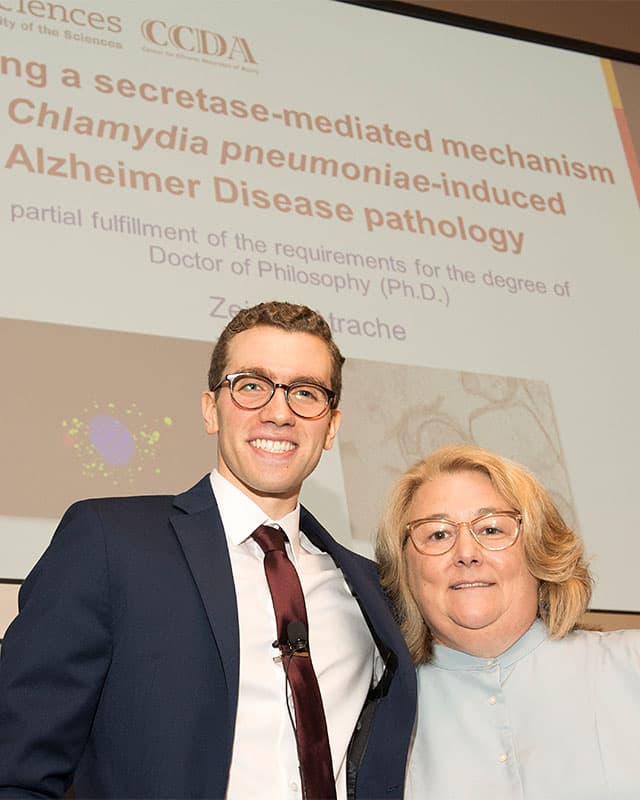Zein Al-Atrache
DO/PhD ’19

Zein Al-Atrache believes that at their core, physicians are clinically-oriented scientists.
“A physician with a strong research background is armed with all the skills needed
to take a valuable question through the process of collecting evidence to support
a meaningful answer,” says Mr. Al-Atrache, who after graduating in May, will be the
College’s first dual DO/PhD in cellular/molecular biology graduate. “After all, medicine
will always need pioneers to put the "evidence" in "evidence-based medicine.”
Mr. Al-Atrache was drawn to research during his time as an undergraduate at the University
of Mary Washington in Fredericksburg, Virginia, studying biology. He had the opportunity
to connect and shadow several DOs—one of whom also held a PhD and worked at the MD
Anderson Cancer Center in Houston, Texas. Mr. Al-Atrache spent a summer with him conducting
leukemia and solid tumor research, and was also able to meet with patients who could
benefit from that work.
“After that, I was fully committed to applying to the right DO/PhD program,” he says.
“I already knew that a physician and, especially a scientist, is only as smart and
skilled as his/her mentors. After going on interviews and talking to the faculty directly,
I didn't get that impression from other schools, so I knew PCOM was the perfect fit
to make me the best physician and scientist I could be.” (PCOM offers its PhD/DO degree
through a partnership with University of the Sciences in Philadelphia.)
During his time at PCOM, Mr. Al-Atrache has had the opportunity to work with PCOM’s
core neuroscience faculty such as Denah Appelt, PhD, professor, neuroscience, on research
that studies the link between infectious agents and neurodegeneration—most notably,
Alzheimer’s disease.
“Their work has contributed greatly to the neuroscience community, bringing together
the fields of immunology and microbiology to explore the hypothesis that infection
may trigger the onset of Alzheimer’s,” he says of his mentors’ work. “That work is
now getting the recognition it deserves, so it’s a very exciting time to help contribute
to this body of knowledge and present my data with their support.”
After graduation, Mr. Al-Atrache will stay with PCOM as a resident in the College’s
neurosurgery program. “A surgeon’s meticulous attention to detail, planning, and execution,
coupled with the highly collaborative, team-driven nature of the operating room appealed
to me,” he said. “And what better way to ask clinically-relevant questions, and apply
those answers right away, than actively in an OR?”
Mr. Al-Atrache says he was drawn to the neurological aspect of surgery while working
with Dr. Appelt, director of the dual degree in cellular/molecular biology program,
whom he says “opened my eyes to the endless questions we still have about the human
brain and spinal cord, and about what happens when those don’t function properly.”
He adds that a dual DO/PhD degree will allow him to more easily navigate between the
bench-top and clinical realms, which he feels can ultimately help improve the quality
of healthcare.
“Armed with the skills that I have had the opportunity to learn and develop, the possibilities
to participate in research are as endless as the questions that we have yet to answer,”
he said. “And this field combines the best of so many medical worlds. It presents
an equally rewarding opportunity to have an immensely important, lasting effect on
a patient's life.”
Mr. Al-Atrache adds that his PhD research would not have been possible without the
generosity of Leonard Giunta, DO ’67, who established a scholarship fund to benefit
the first DO/PhD research student at PCOM and the University of the Sciences.
"Dr. Giunta embodies the spirit of not only a well-rounded osteopathic family physician
but also an immensely successful entrepreneur," said Mr. Al-Atrache. "His dedication
to the advancement of biomedical sciences and biotechnology underscores the importance
of translational research as an integral component of a future physician’s medical
education."


